I got an email from Megan last week asking if I could recreate her favorite frozen noodle bowls from Costco. There isn’t a Costco in New Orleans (yet), so I wasn’t familiar with that particular item, but I’ve been in the mood for a noodle bowl anyway. So, I decided to give it a shot. The result was a super fast, easy, and tasty Teriyaki Noodle Bowl! Yum!
I usually prefer fresh vegetables to frozen, but sometimes when I want a small amount of a lot of different vegetables, it just makes sense to buy a frozen mix, otherwise I’ll have vegetables coming out my ears. The frozen veggies do the job, but they tend to be much softer than fresh when used in stir fries. So, keep that in mind when making your decision.
Megan’s main concern with her store bought noodle bowl was the amount of salt and sugar they contained. Teriyaki sauce is pretty much made up of salt and sugar, so you can’t really get away from that, but at least when you make it yourself you know exactly what’s in there and chances are that it’s still less salt and sugar than the store bought sauce. You can experiment with the recipe and tweak the ingredients to match your palate and dietary needs.
I fully intended to make this with pineapple, but when I got home from the store I discovered that I accidentally bought pineapple in heavy syrup and that doesn’t work. If you want to use pineapple, here’s how: buy an 8oz. can of pineapple chunks in juice, drain the juice and use it in place of the water in the teriyaki sauce. Add the pineapple chunks to the vegetables when you stir fry them and you’re done. Easy :)
…And of course you could always add chicken, pork, or tofu if you want extra protein!
Teriyaki Noodle Bowls
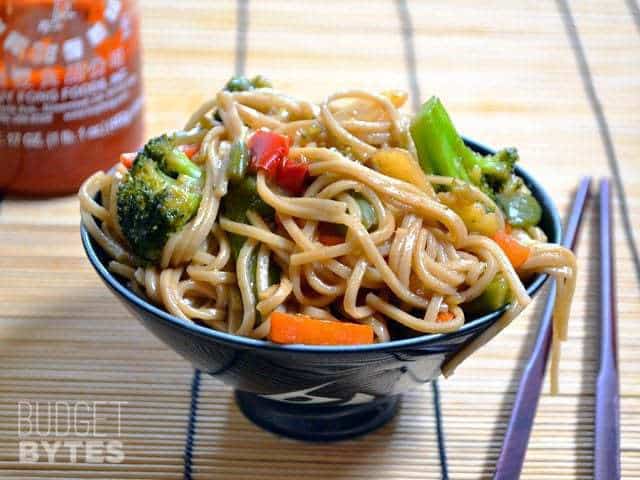
All recipes are rigorously tested in our Nashville Test Kitchen to ensure they are easy, affordable, and delicious.
Teriyaki Noodle Bowls
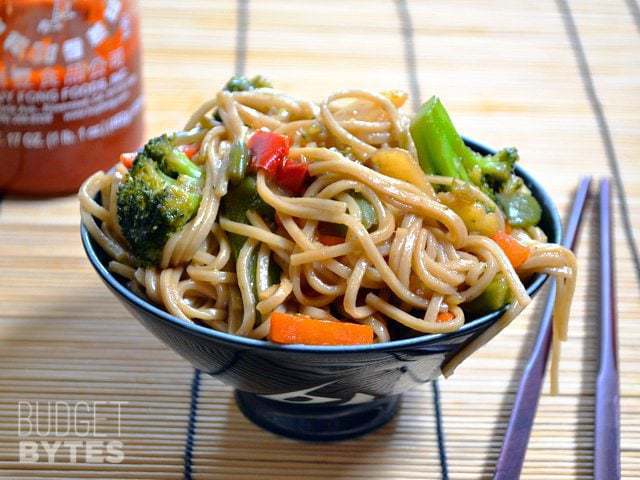
Ingredients
Teriyaki Sauce
- 1/4 cup soy sauce ($0.39)
- 2 Tbsp rice vinegar ($0.23)
- 2 Tbsp brown sugar ($0.03)
- 1/4 tsp toasted sesame oil ($0.05)
- 2 cloves garlic, minced ($0.16)
- 2 inches fresh ginger, grated ($0.21)
- pinch red pepper flakes, optional ($0.02)
- 1 Tbsp cornstarch ($0.04)
- 2 Tbsp water ($0.00)
Noodles & Vegetables
- 1 lb. frozen stir fry vegetables ($1.57)
- 8 oz. buckwheat soba noodles ($3.69)
- 1 Tbsp vegetable oil ($0.02)
Instructions
- Add the soy sauce, rice vinegar, brown sugar, toasted sesame oil, red pepper flakes, corn starch, and water to a bowl. Peel the ginger and then grate it straight into the bowl using a small holed cheese grater. If you don’t have a grater, you can mince the ginger. Mince the garlic and add it to the bowl as well. Stir to combine the ingredients.
- Bring a medium pot of water up to a boil over high heat, add the noodles, and then continue to boil for 5-6 minutes, or until the noodles are tender. Drain the noodles in a colander.
- Heat the vegetable oil in a large skillet over medium-high heat. Once the skillet is hot, add the frozen vegetables. Stir and cook for only about 2 minutes, just to slightly heat the vegetables. Briefly stir the teriyaki sauce and then pour it into the skillet. Allow it to come up to a simmer, at which point it will thicken. The vegetables will finish heating through as this happens. Turn the heat off once the sauce is hot and thick.
- Add the drained noodles to the skillet and stir until they are coated in the sauce. Divide the noodles between four bowls and then spoon any leftover vegetables from the skillet on top. Enjoy!
See how we calculate recipe costs here.
Notes
Nutrition
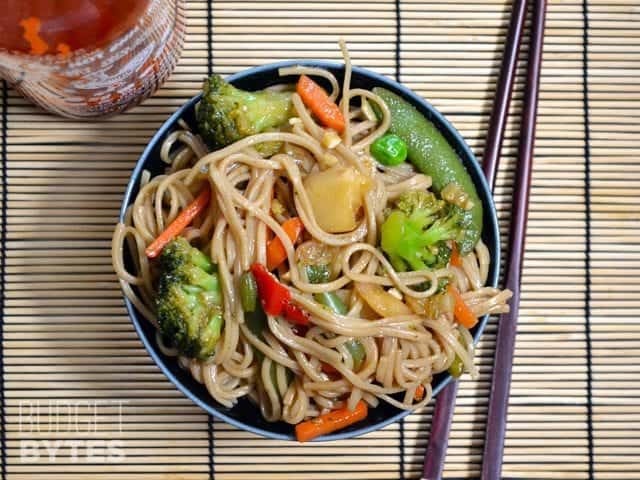
Step by Step Photos
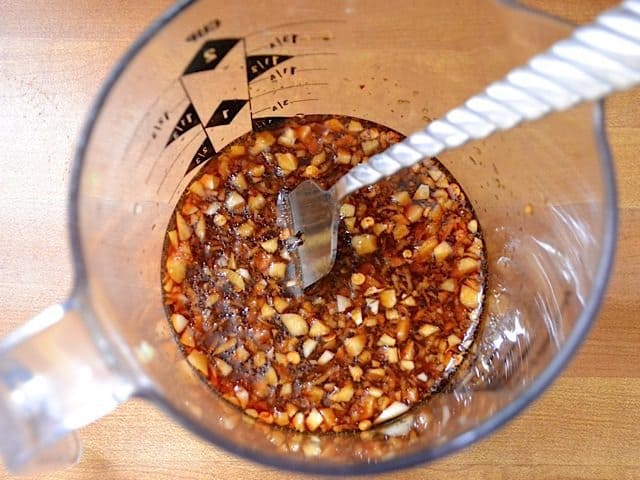
Homemade teriyaki sauce is incredibly easy to make. Just stir together the soy sauce, rice vinegar, brown sugar, sesame oil, red pepper flakes, cornstarch, and water. Grate the ginger and mince the garlic. Stir them into the sauce. (Note: this picture was before I stirred in the cornstarch. It will have a slightly milky/opaque color once the cornstarch is added).
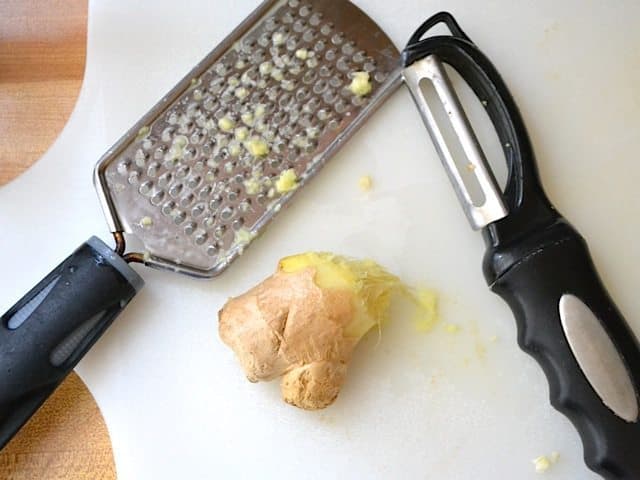
If you’ve never worked with ginger, it’s very simple. You can break off a knob the size you need at the store (just like dividing a bunch of bananas to get just a few – it’s okay). Use a vegetable peeler or the side of a spoon to scrape off the skin, then use a small holed cheese grater to grate the ginger straight into the bowl (so all the juice make it into the sauce). If you don’t have a cheese grater, you can mince the ginger.
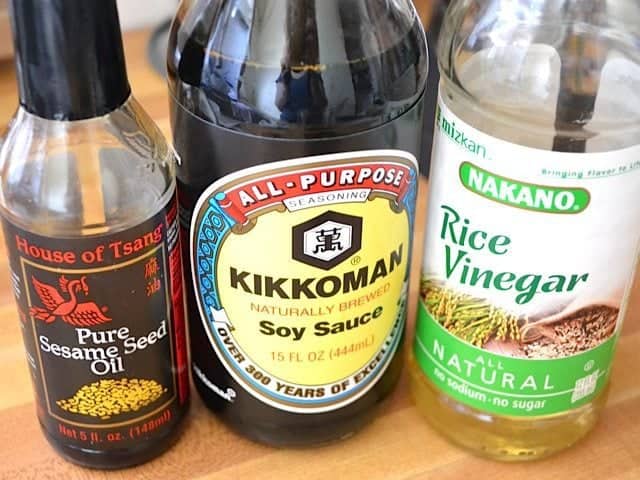
I like to keep these three things in my pantry at all times. So many different Asian sauces can be made with this trifecta. All three are extremely shelf stable and can usually be found in major grocery stores. The soy sauce and vinegar are usually very inexpensive and, while the sesame oil may be a little pricier, you only use a few drops at a time.
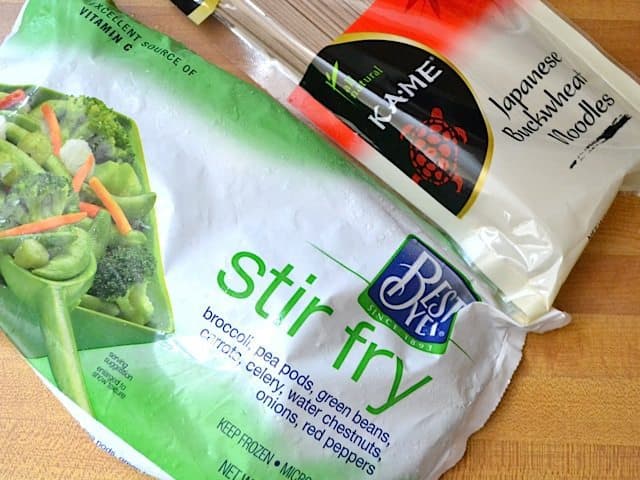
I used buckwheat soba noodles to up the nutritional value of this dish, but you can use a different type of noodle if you’d like. I definitely could have gotten a better price on the noodles if I had gone to a different store, but I paid for convenience in this case. I just bought a bag of generic stir fry vegetables and they did the trick.
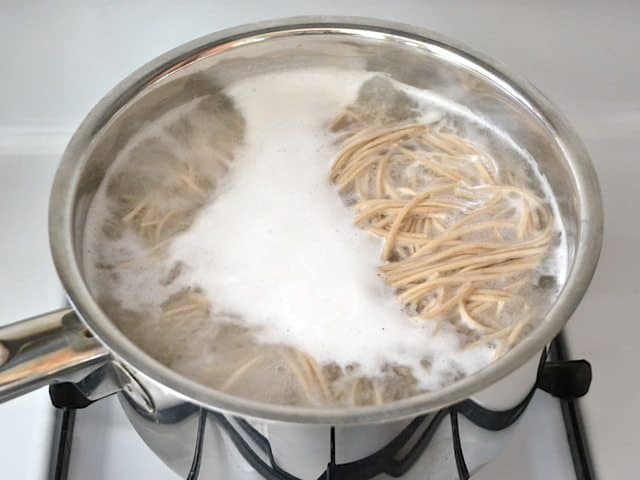
Cook the noodles according to the directions on the package (boil 5-6 minutes) and then drain them in a colander.
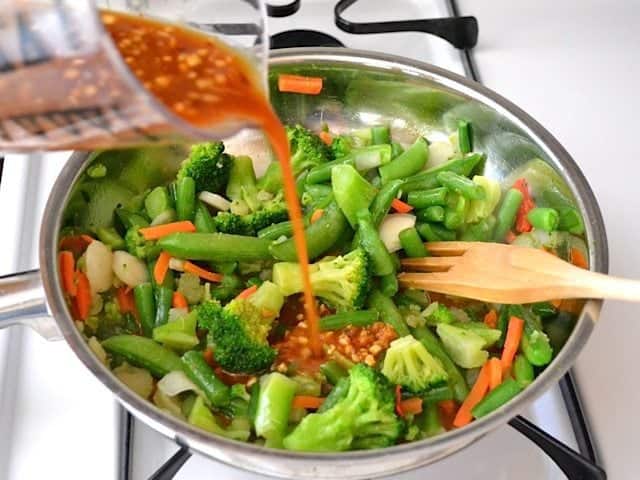
Heat the vegetable oil in a large skillet over medium-high heat. Once it’s hot, add the vegetables and cook for just one to two minutes. Frozen vegetables can be tricky because you want them to heat through without over cooking. Once the vegetables have cooked for just a short minute or two, give your teriyaki sauce a quick stir (to re-suspend the cornstarch) and then pour it into the skillet. Allow the sauce to come up to a simmer.
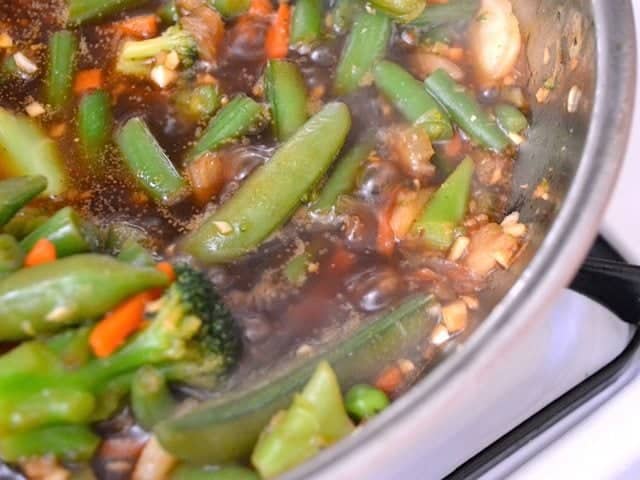
Once the sauce reaches a simmer, that’s when the cornstarch magic happens. The sauce will turn from a milky brown color to a shiny, clear, thick sauce. Taste the sauce to see if you want more soy sauce. If you want a more potent dish, you can just stir in an extra tablespoon of soy sauce. Remember, once the noodles are added the sauce will be spread more thin, so you want it to taste a little on the strong side.
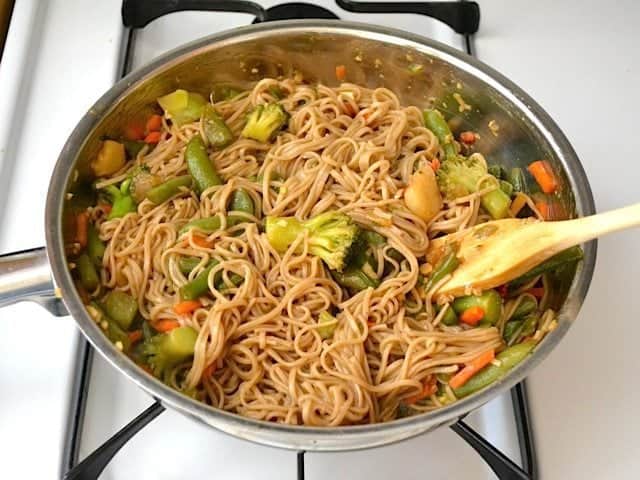
Finally, add the drained noodles and stir them in until they are well coated in sauce. In my experience, it’s pretty impossible to stir chunks of vegetables (or anything else) into long thin noodles like spaghetti. So, I just stirred until the noodles were coated and then divided the noodles between my four dishes and spooned the rest of the vegetables over top.
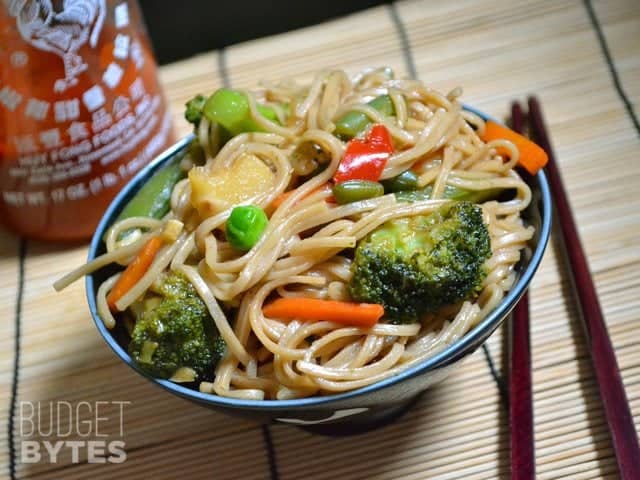
I’m going to experiment with freezing one of these bowls to see how it survives the freeze/reheat cycle. I’ll update the post tomorrow or the day after to let you know how they hold up!


I like many of the recipes on this site, but this one is not great.
Could I substitute the red pepper flakes with powdered paprika (either sweet or hot)? Or is there a fundamental difference apart from texture?
You could try subbing with some hot paprika, but it’s hard to imagine how much it might change things without actually testing it. I don’t think texture would be an issue, though. :)
So I’m not a huge teriyaki fan, but I was looking for a meat free meal so I decided to give this a shot… And didn’t care for it lol. However, my husband, who does like teriyaki, said it was very good “after he added some meat to it” so I gave 4 stars on his behalf, and 1 extra from me because it was such a ridiculously easy meal to prepare.
I used regular white vinegar and powdered ginger and garlic, yet these still turned out delicious! Great with gluten free noodles and chicken too:)
Could I use the noodles that come in the Top Ramen package for this recipe? Or would you recommend whole wheat spaghetti instead?
Yes that would be good in a pinch!
If I wanted to use store-bought teriyaki sauce instead of making my own, how much would I need to use?
I would suggest about 1/2 cup of store bought sauce for 4 servings.
I made these for dinner for my roommates and I and ran into a couple issues. 1.) The recipe had to much vegetables and they quickly overpowered the dish. 2.) I don’t know what happened (it could have been user error) but I didn’t have enough sauce to cover up the noodles, in the future I would use 1.5x the measurements called for here. Otherwise it was super good and easy to make. I used the crispy tofu recipe from somewhere else on this site, and it was an excellent addition.
I added about 2 tablespoons of honey to my sauce and it made it way better then without the honey so I suggest you try
Nope., not a fan, and I really like most Asian dishes as a whole!! My daughter (23) gave it an 8 out of 10. I gave it a 4. I will try a different kind of noodle and try a version of it again. In all honesty, I scoured my grocery store for “toasted” sesame oil, but there was none to be found. I went with just sesame oil. I don’t think that was the problem, however.
Using regular sesame oil instead of toasted sesame oil will definitely make a big difference. Toasted sesame oil has a super strong, nutty flavor. It’s a bummer that your grocery doesn’t carry it! :(
My husband is allergic to sesame — is there something else I can substitute the sesame oil with, or should I just leave it out?
I would leave it out, although the sauce won’t have quite as much depth.
Would this work without sesame oil? Forgot to get it
I feel like the sesame oil really adds a lot of flavor and it would be lacking without it.
Just made this and it is hands down my favorite asian noodle recipe on budget bytes! I wasn’t feeling the pad thai, this teriyaki noodle bowl is much more my style! YUM!!
I had some leftover sushi rice from the sushi bowls recipe and I thought some teriyaki style meat would be great to go with it. So I used the recipe for this sauce to make teriyaki pork and it turned out amazing! I just added a bit more of water to thin the sauce at the end.
To make the teriyaki pork, I pan seared two pork chops until browned. Took them out of the pan, turned heat down and added the sauce; sliced the pork and added it back to the pan and cooked just long enough until no pink color was visible. Served it over the rice with some sesame seeds.
Husband absolutely loved it.
Great recipe. Thank you for sharing.
blargh?